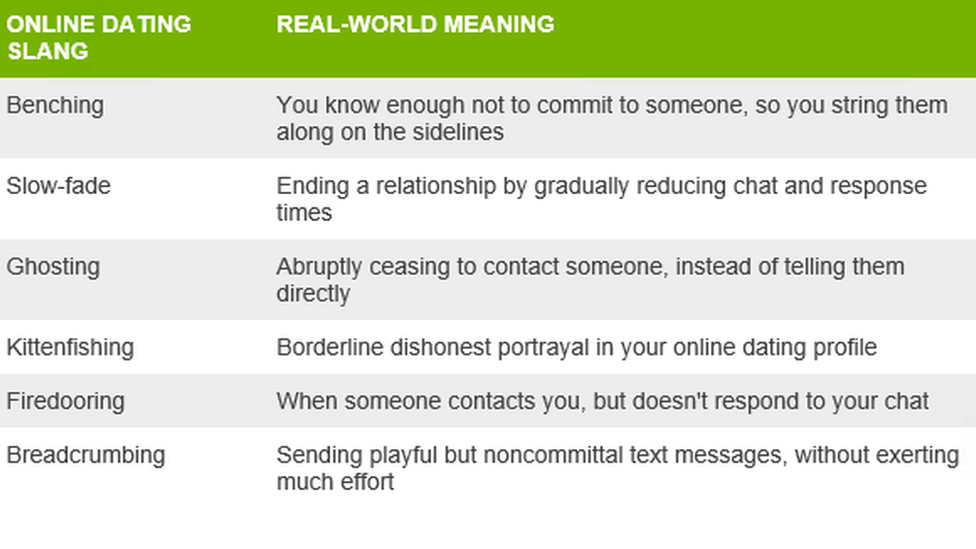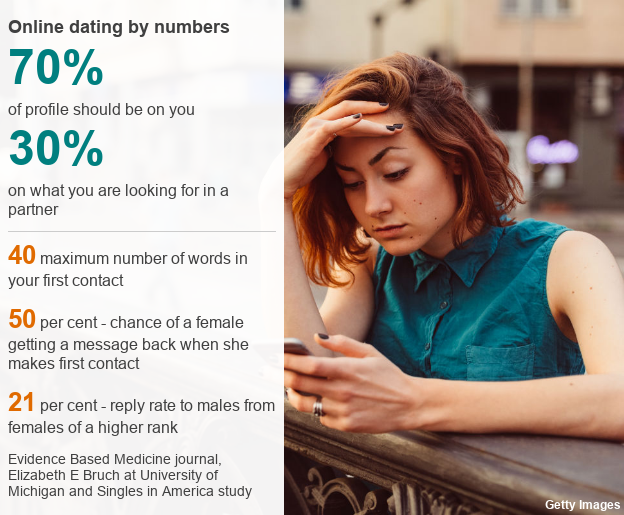Online dating: Aim high, keep it brief, and be patient
- Published

Scientists say the secrets to success in online dating are to aim high, keep your message brief, and be patient.
Playing "out of your league" or dating people considered more attractive than you, is a winning strategy, according to a new analysis of internet daters in the US.
Men had greater success when they approached women they believed were more desirable than themselves.
The new study has been published, external in the journal, Science Advances.
Internet dating has become the dominant form for those seeking romance - it's the third most popular means of meeting a long term partner and around half of all 18-34 year olds now use dating apps.

In this new report, scientists used a Google-inspired algorithm to understand the desires of people wanting to match up. They analysed messaging and demographic patterns among heterosexual users in New York, Boston, Chicago and Seattle.
They found that both men and women contact potential partners who are, on average, around 25% more desirable than themselves.
Your "desirability", they found, is not just about the number of messages that you receive, but who you receive them from.
If your messages come from people who have themselves received lots of messages, that makes make you more desirable, according to the study.


Top tips for a hot date
1) Send lots of messages - perseverance can pay off
2) Aim high - playing out of your league can be a winning strategy
3) Keep it brief - that long heartfelt message might not be read
4) Be patient - your dream date may just be judging the market

When women approached men, they received a response 50% of the time.
When men aimed at women who were rated as more desirable than themselves, their response rate was 21%.
That might seem low but the authors of the study suggest that online daters were wise to take the risk.
"I think a common complaint when people use online dating websites is they feel like they never get any replies," said lead author Dr Elizabeth Bruch from the University of Michigan.
"This can be dispiriting. But even though the response rate is low, our analysis shows that 21% of people who engage in this aspirational behaviour do get replies from a mate who is out of their league, so perseverance pays off."
Generally, most people received a handful of replies at best, but a few people received many more. One woman in the study was bombarded with a new message every half hour, from over 1,500 different people in the month long study.
As the data were wholly anonymised, we can only speculate about what it was about this woman that struck the attention of so many men.
The secret to success - keep it brief
Both men and women tended to write longer messages to a more desirable partner, sometimes up to twice as long, but the study found that this barely makes any difference to the response rate.
Dr Bruch said: "I feel that we can save people a lot of work in not writing longer messages."

Why does writing a longer message not work?
"We don't really know. One of the reasons might be that people that are desirable may have so many messages in their inbox, they don't read most of them. That lovingly crafted message that you spent two hours on may go unopened," said Dr Bruch in an interview with the BBC.
Co-author Professor Mark Newman, also from the University of Michigan, said: "Playing out of your league is one way to reduce the rate at which you get replies. That does not seem to stop people from doing it, and it seems to be standard behaviour. There is a trade-off between how far up the ladder you want to reach and how low a reply rate you are willing to put up with."
If you aren't getting any replies, then be patient. Your potential dates might be judging the market before committing to reply at all.
Although the maths is complicated, research has shown that your chance of picking the best date is highest if you reject outright the first 37%. You should then choose to date the next person that's better than all the previous ones.

There is a formula for using apps such as Tinder
Deal-makers and deal-breakers in dating
Previous studies have shown that your dating profile should be roughly 70% about yourself, external, with the rest about what you're looking for in a partner. But the problem with this thinking is that it assumes that people are going to read your profile or your message in the first place.
Dr Bruch said: "Women could afford to be more aspirational than they are. Their reply rates are already high enough that they can afford to take a hit."
You might also want to think about when you reply. Dr Bruch added: "People's behaviour at two o'clock in morning looks very different from their behaviour at 8 o'clock in the morning. Which is better depends upon what your goals are."
Man's not hot
The study showed that women tended to use more positive words when communicating with more desirable partners, whereas men tended to play it cool, showing a slight decrease in positive words.
Reinforcing a well-known stereotype, women's view of men's desirability peaked at around the age of 50, whereas women's attractiveness to men declined from the age of 18.
The authors stressed that this does not mean following these stereotypes is the key to successful dating. People are able to make choices.
Dr Bruch said: "There can be a lot of variation in terms of who is desirable to whom. There may be groups in which people who would not necessarily score as high by our measures could still have an awesome and fulfilling dating life."
Of course, making contact with dates online is only the first step in courtship. Most messages ended in failure.
Previous research has shown that when people are able to spend proper time together, their characters become far more important than the superficial information that they receive on a dating app.
"I am fascinated with the rules of dating, this paper is the initial leg of that research effort. Once you get past that first response, it is not clear how desirability continues to matter. There is some evidence that people focus on the most superficial aspects of their potential romantic partners at the earliest stages of the relationship and later on those things don't matter so much."
Follow Angus on Twitter, external